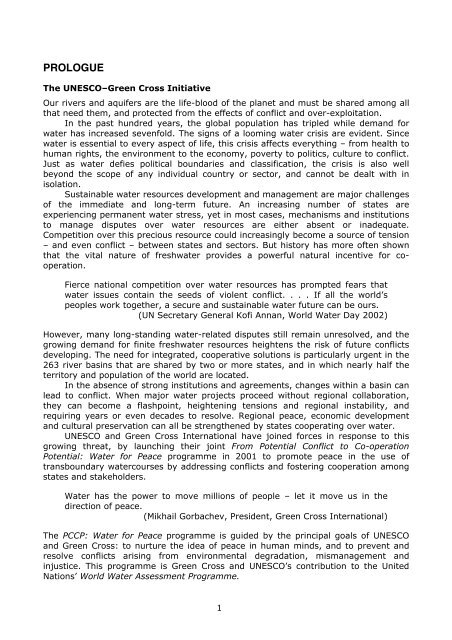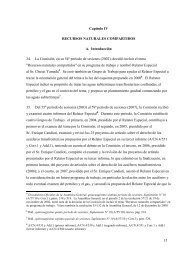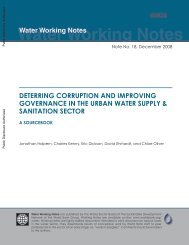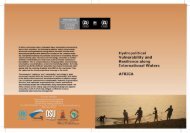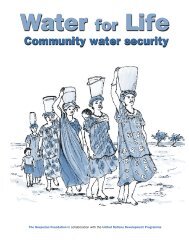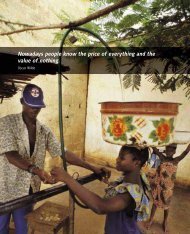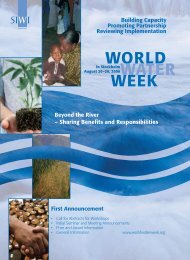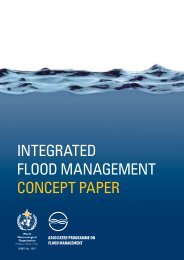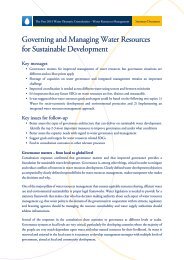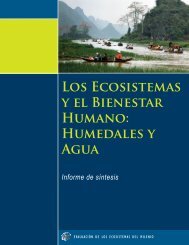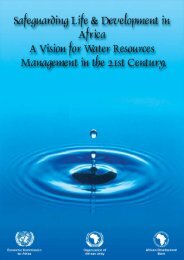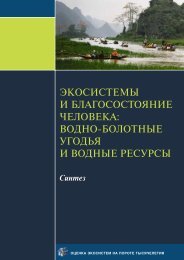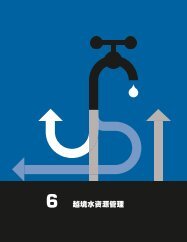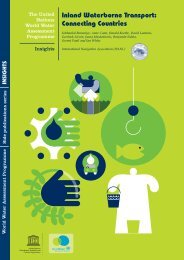Water security and peace: a synthesis of studies ... - unesdoc - Unesco
Water security and peace: a synthesis of studies ... - unesdoc - Unesco
Water security and peace: a synthesis of studies ... - unesdoc - Unesco
Create successful ePaper yourself
Turn your PDF publications into a flip-book with our unique Google optimized e-Paper software.
PROLOGUE<br />
The UNESCO–Green Cross Initiative<br />
Our rivers <strong>and</strong> aquifers are the life-blood <strong>of</strong> the planet <strong>and</strong> must be shared among all<br />
that need them, <strong>and</strong> protected from the effects <strong>of</strong> conflict <strong>and</strong> over-exploitation.<br />
In the past hundred years, the global population has tripled while dem<strong>and</strong> for<br />
water has increased sevenfold. The signs <strong>of</strong> a looming water crisis are evident. Since<br />
water is essential to every aspect <strong>of</strong> life, this crisis affects everything – from health to<br />
human rights, the environment to the economy, poverty to politics, culture to conflict.<br />
Just as water defies political boundaries <strong>and</strong> classification, the crisis is also well<br />
beyond the scope <strong>of</strong> any individual country or sector, <strong>and</strong> cannot be dealt with in<br />
isolation.<br />
Sustainable water resources development <strong>and</strong> management are major challenges<br />
<strong>of</strong> the immediate <strong>and</strong> long-term future. An increasing number <strong>of</strong> states are<br />
experiencing permanent water stress, yet in most cases, mechanisms <strong>and</strong> institutions<br />
to manage disputes over water resources are either absent or inadequate.<br />
Competition over this precious resource could increasingly become a source <strong>of</strong> tension<br />
– <strong>and</strong> even conflict – between states <strong>and</strong> sectors. But history has more <strong>of</strong>ten shown<br />
that the vital nature <strong>of</strong> freshwater provides a powerful natural incentive for cooperation.<br />
Fierce national competition over water resources has prompted fears that<br />
water issues contain the seeds <strong>of</strong> violent conflict. . . . If all the world’s<br />
peoples work together, a secure <strong>and</strong> sustainable water future can be ours.<br />
(UN Secretary General K<strong>of</strong>i Annan, World <strong>Water</strong> Day 2002)<br />
However, many long-st<strong>and</strong>ing water-related disputes still remain unresolved, <strong>and</strong> the<br />
growing dem<strong>and</strong> for finite freshwater resources heightens the risk <strong>of</strong> future conflicts<br />
developing. The need for integrated, cooperative solutions is particularly urgent in the<br />
263 river basins that are shared by two or more states, <strong>and</strong> in which nearly half the<br />
territory <strong>and</strong> population <strong>of</strong> the world are located.<br />
In the absence <strong>of</strong> strong institutions <strong>and</strong> agreements, changes within a basin can<br />
lead to conflict. When major water projects proceed without regional collaboration,<br />
they can become a flashpoint, heightening tensions <strong>and</strong> regional instability, <strong>and</strong><br />
requiring years or even decades to resolve. Regional <strong>peace</strong>, economic development<br />
<strong>and</strong> cultural preservation can all be strengthened by states cooperating over water.<br />
UNESCO <strong>and</strong> Green Cross International have joined forces in response to this<br />
growing threat, by launching their joint From Potential Conflict to Co-operation<br />
Potential: <strong>Water</strong> for Peace programme in 2001 to promote <strong>peace</strong> in the use <strong>of</strong><br />
transboundary watercourses by addressing conflicts <strong>and</strong> fostering cooperation among<br />
states <strong>and</strong> stakeholders.<br />
<strong>Water</strong> has the power to move millions <strong>of</strong> people – let it move us in the<br />
direction <strong>of</strong> <strong>peace</strong>.<br />
(Mikhail Gorbachev, President, Green Cross International)<br />
The PCCP: <strong>Water</strong> for Peace programme is guided by the principal goals <strong>of</strong> UNESCO<br />
<strong>and</strong> Green Cross: to nurture the idea <strong>of</strong> <strong>peace</strong> in human minds, <strong>and</strong> to prevent <strong>and</strong><br />
resolve conflicts arising from environmental degradation, mismanagement <strong>and</strong><br />
injustice. This programme is Green Cross <strong>and</strong> UNESCO’s contribution to the United<br />
Nations’ World <strong>Water</strong> Assessment Programme.<br />
1


